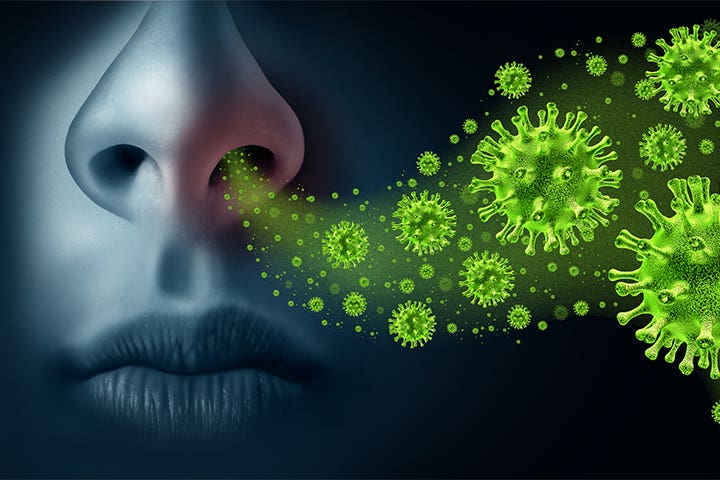The make-up of the gut microbiome may be linked to a person’s risk of developing ‘long COVID’ many months after initial infection with SARS-CoV-2, the virus responsible for COVID-19 infection, suggests research published online in the journal Gut.
Microbiome ‘profiling’ might help identify those who are most susceptible to developing the condition, suggest the researchers.
Post acute COVID-19 syndrome, dubbed ‘long COVID’, is characterised by complications and/or persistent symptoms weeks and months after initial COVID-19 infection.
It is relatively common, with up to 3 out of 4 people reporting at least one symptom 6 months after recovery from COVID-19 infection. Fatigue, muscle weakness, and insomnia are the most commonly reported symptoms.
An exaggerated immune system response, cell damage, or the physiological consequences of a critical illness may contribute to the development of long COVID. But it’s not clear exactly what causes it, or why some people seem to be more susceptible, say the researchers.
A growing body of evidence has implicated the gut microbiome—the trillions of bacteria, fungi, and other microbes that inhabit the digestive tract—in COVID-19 severity.
And given that the gut has a major role in immunity, a disordered immune response to COVID-19 infection, induced by resident microbes, may affect the recovery process too.
The researchers therefore wanted to find out if the make-up of the gut microbiome might be linked to long COVID, defined as at least one persistent symptom 4 weeks after clearance of SARS-CoV-2 from the body.
They tracked changes in the gut microbiome of 106 patients with varying degrees of COVID-19 severity, treated at 3 different hospitals between February and August 2020, and in a comparison group of 68 people who didn’t have COVID-19, over the same period.
They did this by analysing participants’ stool samples. Among the 106 patients with COVID-19, stool samples were collected on admission (68), and again after 1 month (64) and after 6 months (68). Stool samples were also collected from 11 patients 9 months later.
The researchers checked for the presence of the 30 most commonly reported long COVID symptoms 3 and 6 months after initial COVID-19 infection. Aerobic capacity and endurance, an indicator of long COVID, was also measured in a 6-minute distance walk test.
The average age of the patients with COVID-19 infection was 48; just over half were women. Most (81%) had mild to moderately severe infection; 25 were treated with antibiotics.
Long COVID was reported in 86 (81%) of these patients at 3 months and in 81 (76.5%) at 6 months. The most common symptoms at 6 months were fatigue (31%), poor memory (28%), hair loss (22%), anxiety (21%) and sleep disturbances (21%).
There were no significant differences in potentially influential factors, such as age, gender, prevalence of underlying conditions, use of antibiotics or antiviral drugs, or COVID-19 severity between patients with and without long COVID, 6 months after initial infection.
Among the 68 patients with COVID-19 whose stool samples were analysed at 6 months, 50 had long COVID.
While initial viral load wasn’t associated with long COVID, their gut microbiome differed from that of patients without long COVID and those who hadn’t had COVID-19 infection.
These patients had a less diverse and abundant microbiome; the gut microbiome of patients who didn’t develop long COVID was similar to that of those who hadn’t had COVID-19.
Among the bacteria species found in patients with long COVID, 28 were reduced and 14 were enriched both at hospital admission and at 3 and 6 months after hospital discharge. At 6 months, patients with long COVID had significantly fewer ‘friendly’ F. prausnitzii, and Blautia obeum and a greater abundance of ‘unfriendly’ Ruminococcus gnavus and Bacteroides vulgatus than people who hadn’t had COVID-19.
On the other hand, the gut microbiome of those who didn’t develop long COVID showed only 25 changes in bacteria species at hospital admission, and this recovered completely after 6 months.
The researchers then looked at the make-up of the gut microbiome to see if was associated with different categories of long COVID symptoms: respiratory; neuropsychiatric (headache, dizziness, loss of taste and smell, anxiety, poor concentration, disrupted sleep, low mood, poor memory, blurred vision); gastrointestinal; skin (hair loss); musculoskeletal; and fatigue.
Eighty one bacterial species were associated with different categories of long COVID and many species were associated with more than two categories of persistent symptoms.
For example, at 6 months, persistent respiratory symptoms were strongly associated with several opportunistic ‘unfriendly’ microbes, including Streptococcus anginosus, Streptococcus vestibularis, Streptococcus gordonii and Clostridium disporicum.
And several species known to boost immunity, including Bifidobacterium pseudocatenulatum, F. prausnitzii, R. inulinivorans and Roseburia hominis, were depleted in those with long COVID at 6 months.
Similarly, several ‘unfriendly’ bacteria species were associated with poorer performance on the 6-minute walk test among those with long COVID.
At hospital admission, the diversity and richness of gut bacteria in patients who subsequently developed long COVID was significantly lower than that of patients who didn’t, suggesting that particular gut microbial profiles may indicate heightened susceptibility, say the researchers.
This is an observational study, and as such can’t establish cause. And only a small number of participants were included in the study. But the findings echo those of other research, implicating a disordered gut microbiome in a range of long term conditions, point out the researchers.
And they conclude: “In summary, altered gut microbiome composition is strongly associated with persistent symptoms in patients with COVID-19 up to 6 months after clearance of SARS-CoV-2 virus.
“Considering the millions of people infected during the ongoing pandemic, our findings are a strong impetus for consideration of microbiota modulation to facilitate timely recovery and reduce the burden of post-acute COVID-19 syndrome.”

 Microbiome ‘profiling’ might help identify those most susceptible, say researchers
Microbiome ‘profiling’ might help identify those most susceptible, say researchers










.jpeg)











.jpg)




.jpg)


